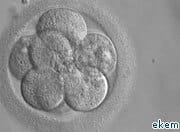British doctors will inject stem cells derived from human embryos into the eyes of young patients suffering sight problems, in the first clinical trial of its kind approved in Europe.
Embryonic stem cell research remains highly controversial because it involves the destruction of human embryos.
Doctors at Moorfields Eye Hospital in London will attempt to use retinal cells derived from embryonic stem cells to treat patients with advanced Stargardt disease, a form of hereditary sight loss.
Landmark
The clinical trial using embryonic stem cells is the first to be approved by regulators outside of the United States and is due to start in the next few months.
It has been given approval by the Medicines and Healthcare Products Regulatory Agency and the clinical trial will aim to test the safety of the treatment.
According to the Daily Mail all twelve participants are in their teens or 20s and it is unclear how much the trial will help, as they are in the advanced stage of the disease.
Vulnerable
Josephine Quintavalle from pro-life group, Comment on Reproductive Ethics, said: “That vulnerable UK patients will be used in highly experimental treatment which would be prohibited in most of the rest of the world is not something to triumph.
“Of course we must look for cures for degenerative eye diseases, but not if the unethical trade-off is the destruction of viable human embryos.”
Professor James Bainbridge, who will lead the trial, claimed: “There is real potential that people with blinding disorders of the retina, including Stargardt disease and age-related macular degeneration, might benefit in the future from transplantation of retinal cells.”
Bias
Last year a renowned adult stem cell expert warned that embryonic stem cell research was over-hyped in the media.
Dr Colin McGuckin took his expertise abroad three years ago because he said the UK’s bias towards embryo research was preventing him from helping people.
Adult stem cell research which doesn’t involve the destruction of embryos, but gathers stem cells from sources such as bone marrow, umbilical cord blood, and the nasal cavity, has already led to over 100 treatments and clinical trials.
But after more than a decade of embryonic stem cell research it is yet to yield any successful treatments.

